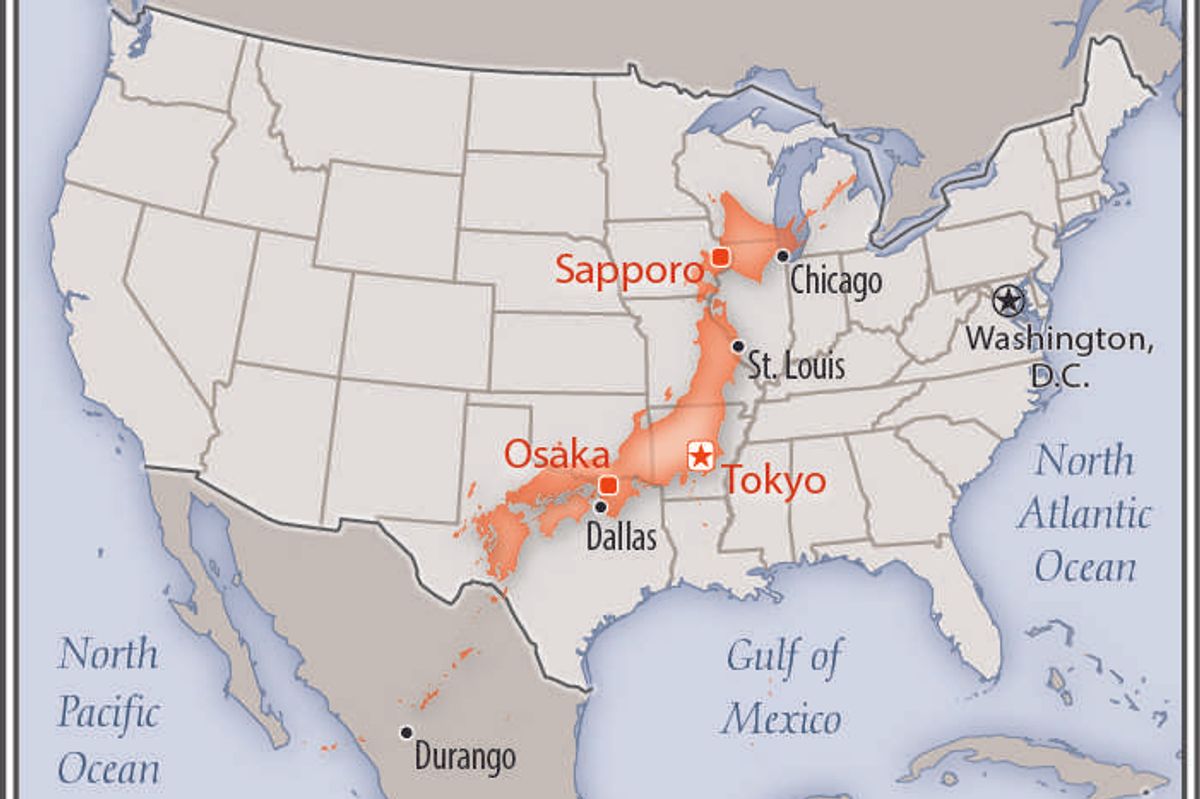Americans share the 15 funniest things they've heard non-Americans say about what the U.S. is like
"A French guy asked me if we really put ranch on everything."
Non-Americans share the funniest things they've heard about what Americans are like.
The United States is unlike any other country in the world. From its sheer size to the abundance of free refills, it's a place and culture that many non-Americans can't wrap their heads around.
On the flip side, it can lead to lots of funny (and sometimes true) assumptions about what the United States and American culture is really like. A Reddit user asked Americans for “the funniest thing a foreigner has said to you about America.”
The answers were a great mix of cultural misunderstandings, myth-busting, and much-needed geography lessons. Here are 15 of the funniest things non-Americans have told Americans about the U.S.
- YouTube www.youtube.com
1. Slick Willy
"While being transported from the airport to the hotel in Morocco, the cab driver said, 'American?' I responded, 'Yes.' His response: 'Ahhh yes. Bill Clinton.'"
"Buddy was in Eastern Europe in the 90s, and a little old lady who spoke no English found out he was American and just said 'Monica Lewinsky' and then laughed."
2. American monsters
"An International Student (from Malta) and I were hanging out at the 'Smoker's Lounge,' aka the place in front of the dorms where people smoked. A raccoon popped out of one of the trash cans, and he freaked out and said that the animals in North America were the size of monsters."
3. It's a big country
"A Japanese person once told me that the US is 'enviably wide.'"
"Because Japan is similarly tall, but lamentably skinny."

4. Melon farmers?
"A guy from the UK I know loves to refer to Americans as melon farmers. Melon farming imbeciles. Doesn't know what some object I refer to is? Must be some kind of weird melon farming contraption. Where have I been the last few days? Must have been tending to my melon farm. I wish I had a backyard instead of a dumb asphalt apartment parking lot? Ah, I must be missing life back on my melon farm."
5. No wood houses
"This man I knew in college was from rural Kenya. Apparently, your temporary house was constructed of wood. Folks that had gained enough wealth no longer had a wooden house."
"We had a guy from Kenya bring pumpkin spice muffins to a potluck. He said something like 'I see how you keep pumpkins on your porches, so I figured you must really love them.'"
6. We love ranch
"A French guy asked me if we really put ranch on everything. I said, 'Yes, even salad,' and he stared at me like I’d just admitted to living in a dumpster."
- YouTube www.youtube.com
7. Guns, guns, guns
"A Persian man that I worked with did a redneck impression. He said 'I'm an American and I like guns and Jesus' in a perfect southern accent."
"When I lived in Italy, one of the first questions my neighbors asked was 'How many guns do you have and where do you keep them all?' They were absolutely floored that I didn’t own any guns."
8. Small world
"A waiter in Prague asked where I was from. I told him Boston. He said, 'Oh, I have a friend named Tomas Dvorak in Wyoming. Do you know him?'"
9. We love peanut butter
"When I studied abroad in Germany, my host family told me 'We bought lots of peanut butter for you. We know Americans need peanut butter.' I do love peanut butter, but I had definitely never heard that stereotype before!"
I did once startle a lovely Australian couple with my PBJ. Apparently, PB and J are only considered compatible here in North America. They looked at the sandwich I made with the same kind of horror I might’ve used on something with, IDK, tuna and marshmallow fluff."
10. Are cheerleaders real?
"'Are cheerleaders real?' Cheerleaders were in movies, but a teenager in London had no idea if that was a real thing. It was a charming conversation as a teenager."
"I like how foreigners will believe that everyone in America is dodging gunfights and car chases on their morning commute, but then think we made up cheerleaders and yellow busses for the movies."
11. Sweet tea is addictive
"A British friend of mine called southern sweet tea 'the most vile, disturbing, horrific swill ever created. Please bring another pitcher.'"
"If they don't have to amputate a foot after your first glass it needs more sugar."
@landontalks Let’s discuss: Sweet Tea in the south. #southern #southernaccent #sweettea #southernliving #thesouth @ibbkate
12. Angry sink
"Saying I had an angry sink because it had a garbage disposal in it."
13. Crossed-up
"My fiancé from the Netherlands asked what the 'zing' road sign meant that he kept seeing everywhere. I couldn’t figure out what the heck he was talking about at first. It was the X-ing (crossing) sign."
"My international colleague thought it was a word in Chinese (Xing) and was very confused by this lol."
14. It's bigger than you think
"My wife's Swedish cousins thought they could go explore both New York City and Los Angeles in a single weekend."
"Also had Swedish visitors, and we live in New England. They wanted to take a drive to California during the 5 days they were going to be here, and they wanted to stop and see the Grand Canyon along the way, then be back in time to catch their flight home out of Boston."
15. The Ohios
"Was at a pub in Italy with a friend, and some of the guys found out we were American. Proceeded to take shots with them toasting ‘to the Ohios!’… we’re not from Ohio lol."
"Which Ohio are you not from, North Ohio, or South Ohio?"
This article originally appeared last year. It has been updated.

